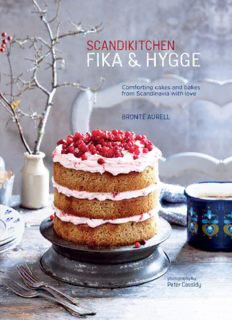
ScandiKitchen: Fika and Hygge: Comforting Cakes and Bakes from Scandinavia with Love PDF
Preview ScandiKitchen: Fika and Hygge: Comforting Cakes and Bakes from Scandinavia with Love
SCANDIKITCHEN FIKA & HYGGE SCANDIKITCHEN FIKA & HYGGE Comforting cakes and bakes from Scandinavia with love BRONTË AURELL Photography by Peter Cassidy CONTENTS Introduction The Scandi Baking Pantry Basic Recipes Biscuits & Cookies Feature: Seven Kinds of Biscuits Traybakes & No Bakes Feature: Feeling Hygge Everyday Fika Feature: How to Fika Little Fancy Cakes Feature: Fancy Fika Celebration Cakes Feature: Winter Celebrations Breads & Batters Feature: For the Love of Baking Index Acknowledgments INTRODUCTION ScandiKitchen, our wonderful café and grocery shop in London’s West End, was born out of pure homesickness and a need to find a space where we could meet up with people for a fika – a cup of coffee and a bite of something sweet to eat. A place where we could meet with family and friends to just enjoy being together and hygge a bit, escaping from the hustle and bustle of day-to- day life. When we first had the idea of opening a Nordic-inspired café almost ten years ago, it was near on impossible to find all the food goodies we missed from home. So we decided to create a place that reflected our love for the foods we missed. Being Swedish and Danish, it always seemed natural that the concepts of fika and hygge had to be at the heart of everything we do at the café. One of the first things Jonas made sure was on the menu was the wholesome cinnamon bun – and Brontë even toyed with the idea of naming the café Hygge – reflecting just how important this concept is to us. We decided hygge might be tricky to pronounce for some, so settled for what we are: a homely Scandinavian kitchen run by a friendly bunch of people. To create a welcoming space was always a priority for us, whether you are a homesick Nordic expat looking for your fix of salty liquorice or anyone else just searching for a nice place for a cup of coffee and a good piece of cake. Anyone can feel a sense of hygge, a state of content cosiness with friends where nothing else seems to matter. Of course, not everybody has the opportunity to just pop by our café to say hello. With this book, we wanted to share some of our favourite autumn and winter treats – perfect for the short, dark winter days. From buns, to cakes, to little pastries – a selection of recipes to make your own traditional fika at home and create cosy feelings of hygge with people you love. For everybody to be able to bring a bit of Nordic loving to their lives through the cakes we love to make and bake. In the years since we opened our doors, much has changed about the way Scandinavia is viewed from outside our home countries. Back when we opened, nobody knew the word fika, and hygge was just another unpronounceable Danish word. Nowadays, books are being written on the concepts of fika and hygge, and it truly feels as if the world is waking up to the wonders of remembering to turn off the noise from our busy everyday routines. While we’re sure they could have done this without Scandinavia’s help, having the words to define what we feel is important. We hope you enjoy this selection of our favourite autumn and winter treats from Scandinavia and that you enjoy creating feelings of hygge and fika in your own homes. Brontë & Jonas Aurell THE SCANDI BAKING PANTRY Scandinavia is a huge place, so what defines an ingredient as ‘local’ varies from hilly Norway to flat Denmark - there’s a 2,500 km/1,500 mile distance between them. However, we all share a love of lots of similar products, so here is a brief guide to some of the products you will need for Nordic baking. We’ve put this together based on things we get asked for at the café, and we often help people source specific ingredients or find local replacements to use instead. You will find a more comprehensive list at www.scandikitchen.co.uk. Popular spices Caraway/kommen/kummin/karve In Scandinavia, caraway is known as kommen, which sounds similar to ‘cumin’ so it is often translated incorrectly in recipes. (Cumin is called spidskommen.) We use caraway seeds a lot in breads as well as cheeses. In this book it is suggested as a flavouring for crispbread (see page 167). Cardamom/karemumme/kardemumma It was actually the Vikings who first sampled this spice during their raids on Constantinople. While we mostly use cardamom in sweet baking and breads, it does occasionally sneak into savoury food (a pinch is used in some regional meatball recipes). It is also sometimes used as a flavouring in strong alcohols. We use the ground variety, which you can buy in larger supermarkets and Asian speciality shops. I favour using freshly ground cardamom, though, because it is one of those spices that lose potency very quickly when pre-ground. If you use freshly ground, watch the quantity, as it is strong and if you are not used to the punchy flavour, hold back a bit. To make ground cardamom at home, either buy cardamom seeds online and finely grind in a spice grinder or pestle and mortar, or open the pods (Scandinavians prefer the green pods) and scoop out the seeds to grind (remove the little woody bits of husk inside the pod and only grind the seeds). Cinnamon/kanel Where would the Nordic people be without their beloved cinnamon buns? We use cinnamon in a lot of our baking, from biscuits to cakes and breads. There are different grades of cinnamon – go for good-quality ground cinnamon. Cloves/nelliker/kryddnejlika/nellik We use both whole cloves and ground cloves in our baking,
